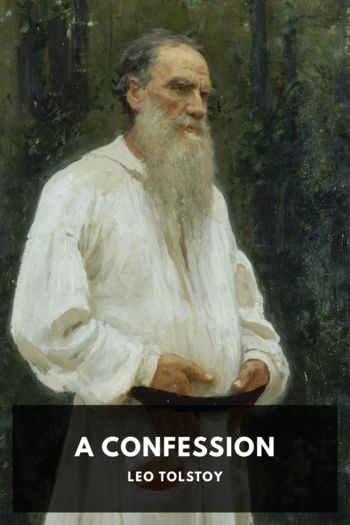Short Fiction by Leo Tolstoy (book reader for pc TXT) 📕

- Author: Leo Tolstoy
Book online «Short Fiction by Leo Tolstoy (book reader for pc TXT) 📕». Author Leo Tolstoy
“You must excuse us if it is not luxurious, Count,” (he very nearly said “your excellency,” so unaccustomed had he become to conversing with important persons), “my sister’s house is so small. But we’ll hang something up there directly and it will be all right,” added the old man, and on the plea of seeing about a curtain, but chiefly because he was in a hurry to give an account of the officers, he bowed and left the room.
The pretty Oustúshka came in with her mistress’s shawl to cover the window, and besides, the mistress had told her to ask if the gentlemen would not like some tea.
The pleasant surroundings seemed to have a good influence on the Count’s spirits. He smiled merrily, joked with Oustúshka in such a way that she even called him a scamp, asked her whether her young lady was pretty, and in answer to her question whether they would have any tea, he said she might bring them some tea, but the chief thing was that their own supper not being ready yet, perhaps they might have some vodka and something to eat, and some sherry if there was any.
The uncle was in raptures over the young Count’s politeness, and praised the new generation of officers to the skies, saying that the present men were incomparably superior to the former generation.
Anna Fyódorovna did not agree—no one could be better than Count Fyódor Ivánitch Toúrbin—and at last she grew seriously angry, and drily remarked, “The one who has last stroked you, brother, is always the best. … Of course people are cleverer nowadays, but Count Fyódor Ivánitch danced the ecossaise in such a way, and was so amiable, that everybody lost their heads about him, only he paid attention to nobody but me. So you see, there were good people in the old days too.”
Here came the news of the demand for vodka, light refreshments, and sherry.
“There now, brother, you never do the right thing; you should have ordered supper,” began Anna Fyódorovna. “Lisa, see to it, dear!”
Lisa ran to the larder to get some pickled mushrooms and fresh butter, and the cook was ordered to make rissoles.
“But how about sherry? Have you any left, brother?”
“No, sister, I never had any.”
“How’s that? Why, what do you take with your tea?”
“That’s rum, Anna Fyódorovna.”
“Is it not all the same? Give some of that—it’s all the same. But would it not, after all, be best to ask them in here, brother? You know all about it—I don’t think they would take offence.”
The cavalryman declared he would warrant that the Count was too good-natured to refuse, and that he would certainly fetch them. Anna Fyódorovna went and put on, for some reason, a silk dress and a new cap, but Lisa was so busy that she had no time to change her pink gingham dress with the wide sleeves. And besides, she was terribly excited; she felt as if something striking was awaiting her, and as if a low, black cloud hung over her soul. This handsome hussar Count seemed to her a perfectly new, incomprehensible, but beautiful being. His character, his habits, his speech, must all be so unusual, so different from anything she had ever met. All he thinks or says must be wise and right, all he does—honourable, all his appearance—beautiful. She never doubted that. Had he asked, not merely for refreshments and sherry, but for a bath of sage-brandy and perfume, she would not have been surprised and would not have blamed him, but would have been firmly convinced that it was right and necessary.
The Count agreed at once when the cavalryman informed them of his sister’s wish. He brushed his hair, put on his uniform, and took his cigar-case.
“Come along,” he said to Pólozof.
“Really it would be better not to go,” answered the Cornet; “Ils feront des frais pour nous recevoir.”196
“Nonsense! they will be only too happy. Besides, I have made some inquiries: there is a pretty daughter. … Come along!” said the Count, in French.
“Je vous en prie, messieurs!”197 said the cavalryman, merely to make the officers feel that he also knew French, and had understood what they had said.
XIILisa blushed, afraid to look at the officers, and casting down her eyes pretended to be busy filling the teapot when they entered the room. Anna Fyódorovna on the contrary jumped up hurriedly, bowed, and not taking her eyes off the Count, began talking to him—now saying how unusually like his father he was, now introducing her daughter to him, now offering him tea, jam, or homemade sweetmeats. No one paid any attention to the Cornet because of his modest appearance, and he was glad of it, for he was, as far as propriety allowed, gazing at Lisa and minutely examining her beauty, which evidently took him by surprise. The uncle, listening to his sister’s conversation with the Count, awaited, with the words ready on his lips, an opportunity to narrate his cavalry reminisces. During tea the Count lit his strong cigar, and Lisa found it difficult to prevent herself from coughing. He was very talkative and amiable, at first slipping his stories into the intervals of Anna Fyódorovna’s ever-flowing speech, but at last engrossing the whole conversation. One thing struck his hearers as strange: in his anecdotes he often used words which, though not considered improper in the society he belonged to, here sounded rather too bold, and somewhat frightened Anna Fyódorovna and made Lisa blush up to the ears; but the Count did not notice it, and remained calmly natural and amiable.
Lisa silently filled the tumblers, which she did not





Comments (0)